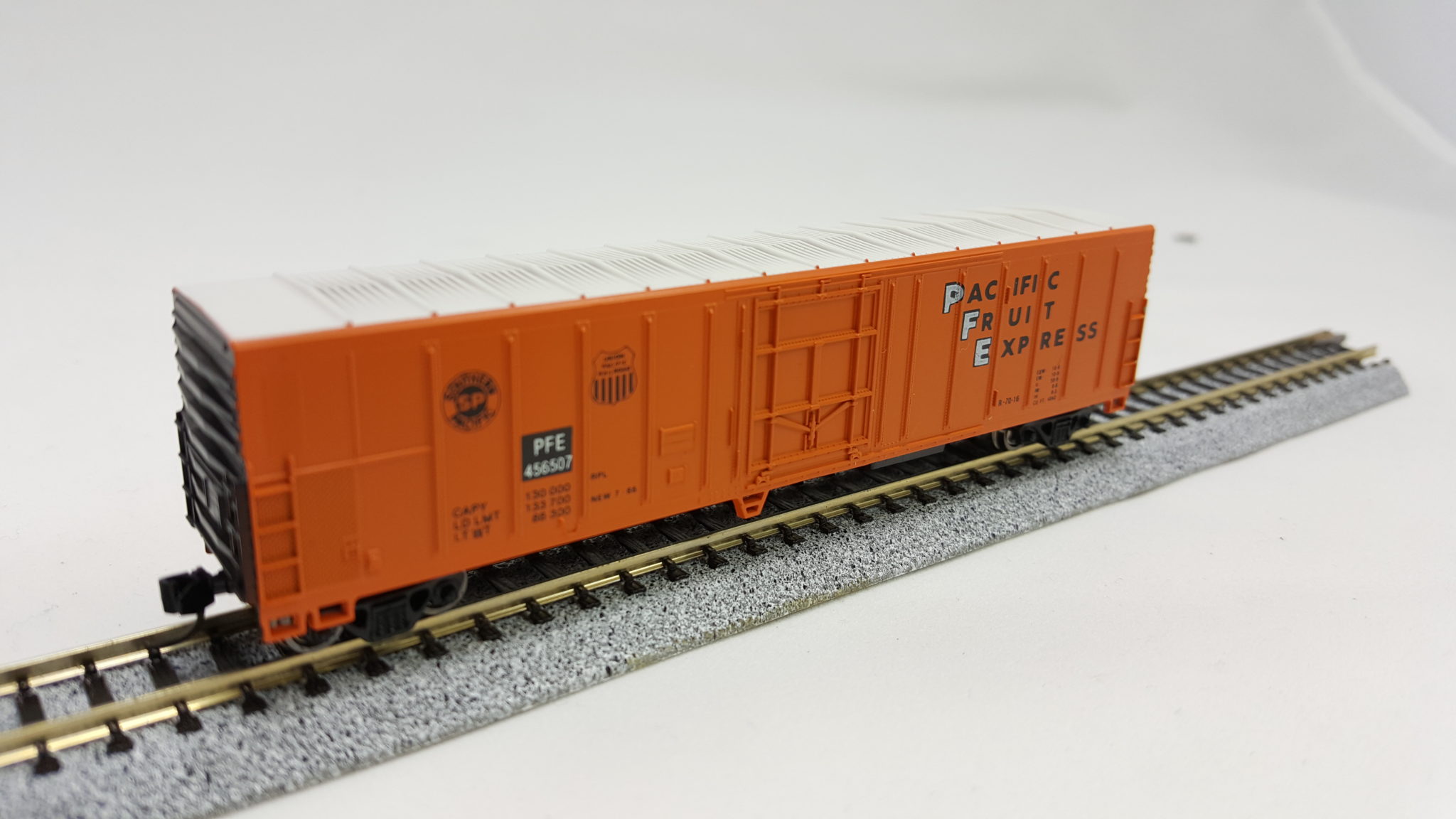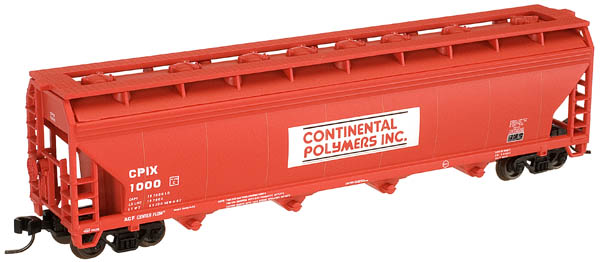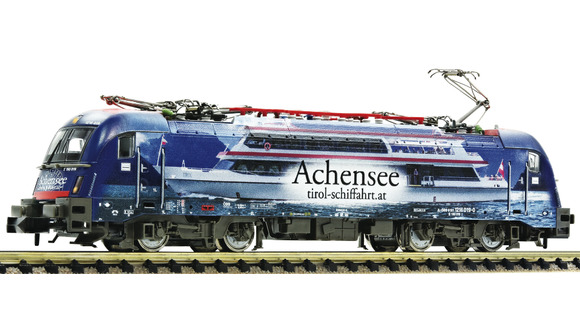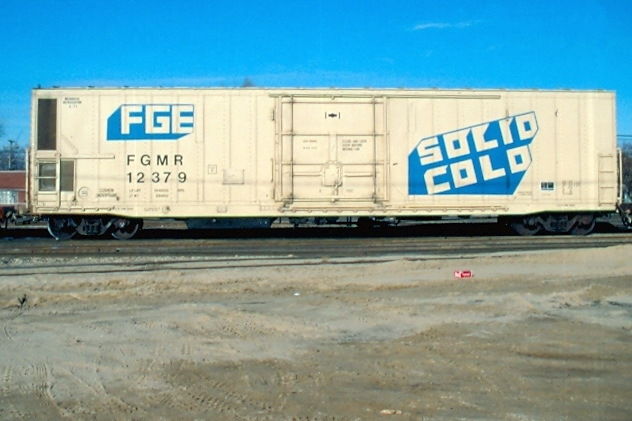Prototype History:
One of the greatest freight car innovations of the 20th century was the creation of the refrigerator car, commonly referred to as a “reefer.” The ability to haul perishables such as fruits, vegetables and meat products across the country was a major factor in the development of modern America. No longer did food have to be produced close enough to urban areas, so that it could be consumed before spoiling. At the same time, areas with additional capacity for agricultural production could produce more food, since it did not have to be sold locally.
For many years, reefers relied on ice bunkers to keep loads cool. After World War II, technological advances made mechanical refrigeration practical for a freight car. In addition, a mechanical reefer could be larger than an ice reefer because of the greater cooling capabilities.
Fruit Growers Express owned the largest fleet of reefers in the East. FGE was owned by a group of ten railroads, with Atlantic Coast Line and Southern being two of the largest original owners. Many of FGE cars were built at its Jacksonville Shops, including these 57’ smooth-side mechanical reefers.
For many years, reefers relied on ice bunkers to keep loads cool. After World War II, technological advances made mechanical refrigeration practical for a freight car. In addition, a mechanical reefer could be larger than an ice reefer because of the greater cooling capabilities.
Fruit Growers Express owned the largest fleet of reefers in the East. FGE was owned by a group of ten railroads, with Atlantic Coast Line and Southern being two of the largest original owners. Many of FGE cars were built at its Jacksonville Shops, including these 57’ smooth-side mechanical reefers.
Road Name History: 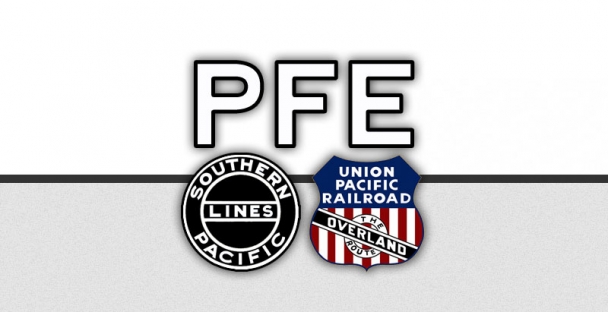 Pacific Fruit Express (reporting mark PFE) was an American railroad refrigerator car leasing company that at one point was the largest refrigerator car operator in the world. The company was founded on December 7, 1906 as a joint venture between the Union Pacific and Southern Pacific railroads. It began operation on October 1, 1907, with a fleet of 6,600 refrigerator cars built by the American Car and Foundry Company (ACF).
Pacific Fruit Express (reporting mark PFE) was an American railroad refrigerator car leasing company that at one point was the largest refrigerator car operator in the world. The company was founded on December 7, 1906 as a joint venture between the Union Pacific and Southern Pacific railroads. It began operation on October 1, 1907, with a fleet of 6,600 refrigerator cars built by the American Car and Foundry Company (ACF).
In 1923, the Western Pacific Railroad joined the venture by leasing its own, brand new fleet of 2775 reefers to PFE. They were painted in standard PFE colors with only WP heralds on the cars instead of the paired UP-SP markings. The WP cars were all retired by the late 1950s, among the last wooden reefers in PFE's fleet. WP ended its partnership with PFE in late 1967 and joined Fruit Growers Express instead.
PFE's assets were divided between the UP and SP when the company was split on April 1, 1978. It is now a UP subsidiary.

In 1923, the Western Pacific Railroad joined the venture by leasing its own, brand new fleet of 2775 reefers to PFE. They were painted in standard PFE colors with only WP heralds on the cars instead of the paired UP-SP markings. The WP cars were all retired by the late 1950s, among the last wooden reefers in PFE's fleet. WP ended its partnership with PFE in late 1967 and joined Fruit Growers Express instead.
PFE's assets were divided between the UP and SP when the company was split on April 1, 1978. It is now a UP subsidiary.
Brand/Importer Information: Con-Cor has been in business since 1962. Many things have changed over time as originally they were a complete manufacturing operation in the USA and at one time had upwards of 45 employees. They not only designed the models,but they also built their own molds, did injection molding, painting, printing and packaging on their models.
Currently, most of their manufacturing has been moved overseas and now they import 90% of their products as totally finished goods, or in finished components. They only do some incidental manufacturing today within the USA.
Important Note: The Con-Cor product numbering can be very confusing. Please see here in the article how to properly enter Con-Cor stock numbers in the TroveStar database.
Currently, most of their manufacturing has been moved overseas and now they import 90% of their products as totally finished goods, or in finished components. They only do some incidental manufacturing today within the USA.
Important Note: The Con-Cor product numbering can be very confusing. Please see here in the article how to properly enter Con-Cor stock numbers in the TroveStar database.
Item created by: CNW400 on 2018-08-29 20:01:06. Last edited by CNW400 on 2020-05-15 09:38:52
If you see errors or missing data in this entry, please feel free to log in and edit it. Anyone with a Gmail account can log in instantly.
If you see errors or missing data in this entry, please feel free to log in and edit it. Anyone with a Gmail account can log in instantly.


